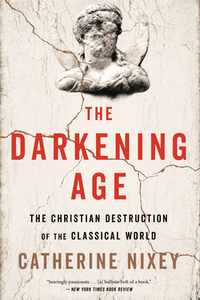You need to sign in or sign up before continuing.
Take a photo of a barcode or cover
263 reviews for:
The Darkening Age: The Christian Destruction of the Classical World
Catherine Nixey
263 reviews for:
The Darkening Age: The Christian Destruction of the Classical World
Catherine Nixey
challenging
informative
slow-paced
While I agree with her thesis, I found it very difficult to read her argument. It felt more like I was reading a series of ranting blog posts rather than a long form, well-planned journalistic piece. At times, she sounds like some of the Christians she (correctly) rails against.
Este ensayo trata de una religión monoteísta venida de Oriente que se extiende por Europa y destruye la tolerante y cosmopolita civilización dominante. Y esa religión es el cristianismo.
La tesis del libro es que esa historia de que en el Imperio Romano la religión estaba en crisis (era casi laico, si me apuras) y que los paganos no eran realmente creyentes y que el cristianismo simplemente ocupó un agujero que existía de forma pacífica y sin mucho esfuerzo es eso, una historia. Un cuento. Una fantasía.
La verdad es que es cristianismo se impuso por la fuerza. Por la violencia física acompañada de la violencia legítima ejercida por las leyes redactadas a su medida por los emperadores cristianos. Los cristianos se extendieron rompiendo templos, estatuas y huesos. Eran fanáticos religiosos que no permitieron ninguna otra idea ni representación de las mismas que no fuera la suya. Y lo hicieron a conciencia (si se me permite el chiste). La muerte de Hipatia de Alejandría no fue una terrible excepción.
Lo que nos deja con una idea inquietante: nosotros, lo que conocemos como Occidente, no somos los descendientes de los romanos, de los paganos, con su filosofía y su tolerancia, somos los descendientes de la panda de fanáticos intolerantes que destrozaron y enterraron toda una civilización. Es bueno saberlo para cuando queramos actuar como moralmente superiores. También tiene su gracia descubrir que discusiones actuales ya se entablaban hace más de 1000 años. Y casi usando los mismos argumentos.
El libro en sí es ameno y fácil de leer. Me hubiera gustado que ahondara en alguna de las ideas o momentos de los que habla, pero entiendo que en aras de facilitar y aligerar la lectura era necesario hacerlo así. De todas formas, Nixey se ha documentado bien y el texto está bien fundamentado.
Es un libro interesante que nos descubre un periodo muy concreto de la Historia, y si se tiene curiosidad creo que merece la pena.
La tesis del libro es que esa historia de que en el Imperio Romano la religión estaba en crisis (era casi laico, si me apuras) y que los paganos no eran realmente creyentes y que el cristianismo simplemente ocupó un agujero que existía de forma pacífica y sin mucho esfuerzo es eso, una historia. Un cuento. Una fantasía.
La verdad es que es cristianismo se impuso por la fuerza. Por la violencia física acompañada de la violencia legítima ejercida por las leyes redactadas a su medida por los emperadores cristianos. Los cristianos se extendieron rompiendo templos, estatuas y huesos. Eran fanáticos religiosos que no permitieron ninguna otra idea ni representación de las mismas que no fuera la suya. Y lo hicieron a conciencia (si se me permite el chiste). La muerte de Hipatia de Alejandría no fue una terrible excepción.
Lo que nos deja con una idea inquietante: nosotros, lo que conocemos como Occidente, no somos los descendientes de los romanos, de los paganos, con su filosofía y su tolerancia, somos los descendientes de la panda de fanáticos intolerantes que destrozaron y enterraron toda una civilización. Es bueno saberlo para cuando queramos actuar como moralmente superiores. También tiene su gracia descubrir que discusiones actuales ya se entablaban hace más de 1000 años. Y casi usando los mismos argumentos.
El libro en sí es ameno y fácil de leer. Me hubiera gustado que ahondara en alguna de las ideas o momentos de los que habla, pero entiendo que en aras de facilitar y aligerar la lectura era necesario hacerlo así. De todas formas, Nixey se ha documentado bien y el texto está bien fundamentado.
Es un libro interesante que nos descubre un periodo muy concreto de la Historia, y si se tiene curiosidad creo que merece la pena.
definitely worth reading because it changes the way you´ll look at your christian heritage. As a member of the european population, Christian heritage is part of my upbringing, whether I like it or not, and this book made me understand some finer points of the development of way of living and above all, SEEING the world. Great!
Its only 4 stars because I felt a lack of real explications about the why and HOW christianity spread so widely in the 1-5 century AD. The author tells us about how many people didn´t like it that way and how they protested but in the end: why then did christianity take over the Roman Empire? Nixey talks about some of the theories that have tried to tackle this question and puts them aside but unfortuntaley doesn´t offer any explication of her own. But still - a very inspiring read!
Its only 4 stars because I felt a lack of real explications about the why and HOW christianity spread so widely in the 1-5 century AD. The author tells us about how many people didn´t like it that way and how they protested but in the end: why then did christianity take over the Roman Empire? Nixey talks about some of the theories that have tried to tackle this question and puts them aside but unfortuntaley doesn´t offer any explication of her own. But still - a very inspiring read!
This book was absolutely fantastic. A succinct description of the attack by Christianity on philosophy and established traditions in late antiquity. I knew some of this information but to read it all laid out like this was like coloring in a picture that I didn't realize I only had outlines to. It also helps place even our current views about paganism and Christianity in a framework all the way down to today.
I wasn't a big fan of this book on the whole. I was expecting more narrative than it gave rather that what ended up feeling like a selection of often repetitive blog posts which delved into more Christian bashing than specifics.
It's worth noting that as a Christian I might be biased against what's written and simply butt hurt.
That being said for someone who's parents were an ex nun and monk it was surprising that there were multiple errors made as to what Christians believe, such as how many people survived the flood with Noah.
There were numerous examples of pretty unreasonable interpretations of the actions of ancient Romans and Christians.
There were Romans who were described as having no particular dislike around Christians despite beating them to death for the sake of it.
There were snippets of a really interesting story that I wish the whole book could have followed. And the concept clearly has so much to be unpacked. Moreover the general anger towards Christianity I completely understand given how she must have spent a long time researching such deplorable Christian actions. However how this was handled I thought was immature and poorly executed.
I'm really annoyed as I had a lot of specific thoughts about this book but put off writing a review exactly because of the fact that I had all those thoughts. So now I can't quite remember everything I'd wanted to say.
I would say I'd update this review if I reread it but I know that I'm not going to.
It's worth noting that as a Christian I might be biased against what's written and simply butt hurt.
That being said for someone who's parents were an ex nun and monk it was surprising that there were multiple errors made as to what Christians believe, such as how many people survived the flood with Noah.
There were numerous examples of pretty unreasonable interpretations of the actions of ancient Romans and Christians.
There were Romans who were described as having no particular dislike around Christians despite beating them to death for the sake of it.
There were snippets of a really interesting story that I wish the whole book could have followed. And the concept clearly has so much to be unpacked. Moreover the general anger towards Christianity I completely understand given how she must have spent a long time researching such deplorable Christian actions. However how this was handled I thought was immature and poorly executed.
I'm really annoyed as I had a lot of specific thoughts about this book but put off writing a review exactly because of the fact that I had all those thoughts. So now I can't quite remember everything I'd wanted to say.
I would say I'd update this review if I reread it but I know that I'm not going to.
dark
reflective
sad
medium-paced
The Roman Empire converting to Christianity doesn’t get a lot of coverage, probably because it’s tough to not see the Christians as the bad guys (as compared to Christians being persecuted by Rome which unsurprisingly gets a lot more press).
After it became the official state religion it saw it as its holy obligation to eradicate any traces of their old gods, who were now seen as demons deceiving mankind (according to the Christians, to everyone else these were still the gods). Statues were defaced, temples torn down, worshippers persecuted and libraries were destroyed as science and philosophy were replaced by doctrine and orthodoxy.
The author pulls no punches making a case for this being one of the worst things to happen in history.
After it became the official state religion it saw it as its holy obligation to eradicate any traces of their old gods, who were now seen as demons deceiving mankind (according to the Christians, to everyone else these were still the gods). Statues were defaced, temples torn down, worshippers persecuted and libraries were destroyed as science and philosophy were replaced by doctrine and orthodoxy.
The author pulls no punches making a case for this being one of the worst things to happen in history.
Graphic: Bullying, Death, Genocide, Hate crime, Homophobia, Infidelity, Misogyny, Sexism, Slavery, Suicide, Torture, Violence, Forced institutionalization, Xenophobia, Police brutality, Religious bigotry, Pregnancy, War, Classism
Nixey herself recognises the tenuous nature of the sources available to anyone attempting to clearly evaluate this transitional period; yet she goes ahead and presents a wholly convinced opinion anyway, one which she defends primarily by cataloguing extant records of deplorable behaviour by early Christians rather than by offering a truly comprehensive analysis or elucidation thereof, a strategy which quickly becomes tedious and banal rather than illuminating and persuasive.
Libro realmente interesante, con multitud de datos que desconocía. A pesar de ser un ensayo, está escrito de un modo sencillo que lo hace ameno... recomendable!
informative
reflective
slow-paced




